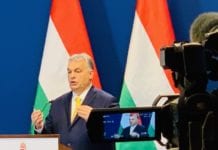
BUDAPEST/GODOLLO (BosNewsLife)–United Nations human rights chief Navi Pillay has called for international intervention in Libya to stop mass killings and bloodshed that she said may amount to crimes against humanity.
Her comments Friday came as European defense ministers met in Hungary, where NATO Secretary-General Anders Fogh Rasmussen did not rule out enforcing a no-fly zone above Libya among other measures to end the violence.
Rasmussen told reporters that the council of the North Atlantic Treaty Organization would discuss Friday what role the Western military alliance could play in Libya.
He said the emphasis for now is on humanitarian aid, but he did not rule out NATO’s involvement in enforcing a no-fly zone for Libyan aircraft if mandated by the United Nations.
“We should give cooperation of evacuation of people in need and to humanitarian assistance,” he said. “As regards the no-fly zone, it has not been discussed yet. I would, however, say that such a far-reaching approach would require a very clear international legitimacy and in particular a United Nations mandate.”
(READ MORE AFTER THIS MESSAGE. CLICK ON THE LINK FOR MORE INFORMATION)
There has been growing pressure on NATO to enforce a no-fly zone, amid reports that forces still loyal to Libyan leader Moammar Gadhafi are using military planes to attack opponents of the regime.
Rasmussen expressed anger about the reported role of security forces in the crackdown on often unarmed protesters.
“I strongly condemn the use of force. It is absolutely outrageous that the Libyan regime apparently uses armed forces against its own people,” he said.
DEFENSE MINISTERS
Rasmussen spoke at a meeting of European defense ministers in Hungary, which is currently holding the rotating six-month presidency of the European Union.
His comments came after U.N. High Commissioner for Human Rights Navi Pillay urged international intervention.
Speaking in Geneva, she expressed concerns that thousands of people may have been killed or wounded in the mounting violence against anti-government protesters, many by shots to the head or chest.
“They have appealed to the United Nations and to the international community for protection. We owe them our solidarity and protection from violence,” she said. “We must heed their aspiration for freedom, dignity and responsible governance. Far from being manipulated by external forces, their protest is a display of people’s power, an exercise of direct democracy that deserves and commands international respect and support.”
ROYAL PALACE
EU foreign policy chief Catherine Aston said using military force was not discussed during the gathering in the Royal Palace of Godollo, a town near Budapest.
She said there is concern about the thousands of EU citizens still left in Libya and that EU member states are cooperating to evacuate them.
Ashton said she has been in close contact with U.N. Secretary-General Ban Ki-moon about the situation.
“In Libya, we now watch,” she said. “We have been very clear in our statements to Gadhafi to stop the violence. And we are working closely with the U.N. I spoke to U.N. Secretary-General Ban Ki-moon a few moments ago. I mean, one of the reasons that this meeting is taking place is for defense ministers to be able to think about how they can best collaborate. I don’t think at this point there is any discussion on any sort of military action around Libya.”
MILITARY COOPERATION
The Libyan situation also underscored plans by European defense ministers to increase military cooperation among NATO and EU member states at a time of global economic crisis.
Rasmussen said he is working on a plan involving the EU and NATO sharing resources to help each other in purchasing expensive military equipment at a time of economic austerity measures.
As an example, the NATO chief mentioned the cooperation of several member states in stationing three C-17 cargo planes at a former Soviet military base in Hungary to aid NATO missions.








